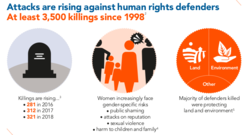BHRRC | 10 June 2019
Human rights defenders face reprisals. Here’s what OECD and National Contact Points can do to protect them.
Ana Zbona, BHRRC, and Marian Ingrams, OECD Watch
A new Factsheet from OECD Watch and BHRRC sheds light on the risks to defenders who complain to OECD National Contact Points and makes recommendations on how to reform the system to keep them safe.
Many human rights defenders use non-judicial grievance mechanisms as an avenue to seek justice for harmful impacts of development projects and other business activity.
One of the leading non-judicial mechanisms defenders use to fight harmful business activity is the system of National Contact Points (NCPs) of the Organisation for Economic Cooperation and Development (OECD).
Since the year 2000, over 300 complaints have been filed by communities and non-governmental organisations against businesses that fail to meet the standards on responsible business conduct set out in the OECD Guidelines for Multinational Enterprises (Guidelines).
However, filing complaints can come at a cost. Engaging with the NCP system can increase defenders’ risk of reprisals by raising company and host-government awareness of defenders’ identities and activism.
And when reprisals do occur, too often NCPs don’t know how to respond, or respond inadequately.Research by the Business & Human Rights Resource Centre and OECD Watch - the civil society network that monitors the effectiveness of the OECD Guidelines and complaint system - explores the incidence of reprisals related to NCP complaints.
The fact sheet released today shows that:
- NCPs regularly handle complaints involving reprisals against human rights defenders. The reprisals have occurred before, during, and after the filing of complaints. At a minimum, at least 25% of complaints filed by communities or NGOs have included reprisals against complainants. And 25% is a conservative estimate, as many reprisals go unreported.
- At least 20 NCPs have handled reprisals-linked cases, while five NCPs have handled between six and 13 reprisal-linked cases. The countries whose NCPs handle the most reprisal-linked cases are largely the same as those whose businesses are most linked to attacks on human rights defenders in their overseas investments.
- 64% of reprisals occurred in the land-intensive extractives and agriculture sectors. 55% of victims were rural community members or indigenous groups.
- Of the companies implicated in reprisals in NCP cases, 23 are “repeat offenders” linked to other reprisal situations outside the NCP system.
This is part of a broader trend: reprisals against human rights defenders are increasing worldwide. Since 1998, over 3,500 defenders have been killed for their activism. Since 2015, Resource Centre has tracked more than 1,600 attacks against defenders opposing harmful business activity. The backdrop to these reprisals is the widely acknowledged closing of civil society space—an apparent decline in governments’ willingness to protect peoples’ fundamental rights, and to prioritize business interests and profit.
The member states of the OECD—which include most of the wealthiest democracies in the world—have a critical role to play in preventing and addressing reprisals. NCPs should do better to protect defenders using the OECD Guidelines complaint system, and they are in a unique position to have meaningful impact.
NCPs have two main tasks: raising awareness among businesses about the Guidelines’ standards, and helping to resolve complaints against companies alleged to have breached the Guidelines. To better address reprisals, NCPs can establish a no-tolerance stance against reprisals. They can teach businesses how to better identify, prevent and respond to reprisal risks in their supply chains.
They can increase safeguards for complainants using the complaint mechanism, and help connect complainants with resources if they face threats. And NCPs can use the OECD system to seek action from member governments regarding companies repeatedly found linked to reprisals.
What can be done?
But to be able to do this, NCPs need a clear mandate that they should address the real and potential risks to human rights defenders who use their complaint mechanism, as well as capacity-building and guidance on how to put that mandate into practice.
This means OECD member governments need to prioritize a focus on reprisals as a key issue for NCPs. Ideally, the OECD Guidelines should themselves reflect expectations for multinational enterprises in preventing and addressing reprisals, and procedures for NCPs to respond to risks.
So far, neither the OECD nor the NCPs have addressed the issue of reprisals against defenders in a concerted manner. Many NCPs do not know what to do when a reprisal-linked case comes their way.
Other mechanisms—such as the Independent Accountability Mechanisms of the development finance institutions—are starting to develop practical guidance to know how to respond to reprisals. The OECD must do the same and risks falling behind best practice if it does not act.
The OECD member states and the OECD Investment Committee—perhaps working together with the Independent Accountability Mechanisms, the United Nations and other government-backed institutions— have an opportunity to develop clear policy guidance on reprisals and protection of human rights defenders, in line with best practices from their peers.
This would send a clear message to NCPs about the powerful role they can play in protecting defenders, and to businesses about what abuses governments will not tolerate.
NCPs can and should be a protective mechanism for defenders, and not increase risk and insecurity.
Ana Zbona is Civic Freedoms & Human Rights Defenders Project Manager at BHRRC. Marian Ingrams is Coordinator of OECD Watch.













